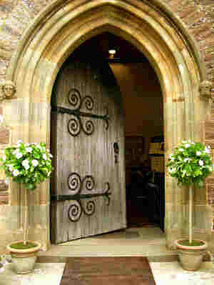
What the Pope is doing in this is calling the Catholic Church back to the essence of its faith, wanting the Church to reflect the merciful face of God, something not always associated with the Church, especially in these days of films such as Philomena and Spotlight. For Francis the core of the gospel and the core of christianity is to be seen in three parables, the stories of the lost sheep, the lost coin and the Prodigal Son. The parables of the lost sheep and the lost coin have a similar theme. They're not so much about what's been lost as the shepherd and the woman who do not rest until they've found what they've lost. And for the Pope they reflect the mercy of God and the message of Jesus who talked again and again of God's care for everyone - because they were God's children and not because of religion, race, sexual orientation or any of the myriad ways we like to categorise people. For the Pope there are no outsiders and like Jesus he wants to challenge us to look at those we might consider to be outsiders in a new way, even recognising that these so called outsiders can reflect the mercy and compassion of God more clearly than the so called insiders. Perhaps the most best known parable of Jesus is the story of the Good Samaritan. What's significant here is that the establishment and professional religious people pass by - maybe they were even returning from religious services in the Temple in Jerusalem, maybe they were concerned about ritual impurity, maybe they were suspicious that this was a trap and feared for their safety. Whatever it was they passed by and it was the Samaritan, considered a heretic and even an enemy, who stopped and cared for the wounded man who probably was a Jew.
It doesn't take much of a leap of imagination to know where institutional religion usually stands. For most religions those who do not conform either in practice or belief have been excluded. All religions have their heretics. Those who do not belong have been thought of as outsiders. We've lived in a world of them and us. But now the world of interfaith relations is helping us relate in new ways. We're recognising that we've much in common with people of different faiths, that we can learn from them and together we have a concern for peace and justice in our world which is after all our common home. Love, justice, mercy, compassion are at the heart of all our faiths but these have more often than not become obscured by institutional concerns and a desire for orthodoxy and orthopraxy as well as a truth that they think is their sole possession. Pope Francis, however, has a gift for simply paying attention to different things. He is for sure, othodox in his belief and practice but the focus of his attention is on people with whom he has a natural rapport. Because of this he is showing forth the human face of the Church. This is also the case in his relationship with other faiths.
In section 23 of the letter which instituted the Year of Mercy he recognises that mercy goes beyond the confines of the Church. He acknowledges that mercy "relates us to Judaism and Islam, both of which consider mercy to be one of God’s most important attributes. ..........the Old Testament are steeped in mercy, because they narrate the works that the Lord performed in favour of his people at the most trying moments of their history. Among the privileged names that Islam attributes to the Creator are “Merciful and Kind”. This invocation is often on the lips of faithful Muslims who feel themselves accompanied and sustained by mercy in their daily weakness. They too believe that no one can place a limit on divine mercy because its doors are always open". The Pope then goes on to say "I trust that this Jubilee year celebrating the mercy of God will foster an encounter with these religions and with other noble religious traditions; may it open us to even more fervent dialogue so that we might know and understand one another better; may it eliminate every form of closed-mindedness and disrespect, and drive out every form of violence and discrimination."
There can be no better vision for those of us involved in interfaith relations. Hopefully this year of mercy might take us forward in our journey to realising it.


 RSS Feed
RSS Feed
